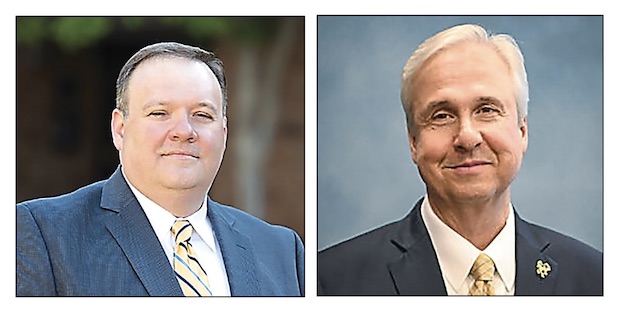Choosing a new leader: A closer look at the two finalists for university president
Published 10:51 am Saturday, April 20, 2024

- Andy Benoit, left, and Wade Rousse. (Special to the American Press)
On Wednesday, Andy Benoit Jr., vice president of enrollment management, Texas A&M University, and Wade Rousee, executive vice president, McNeese State University, were selected by the University of Louisiana System McNeese Presidential Search Committee as finalists.
A special meeting will be held on Thursday to interview the finalists and select McNeese’s new president.
During the semifinalist interviews on Wednesday, the candidates were asked about their motivations, experiences and priorities for McNeese.
Andy Benoit Jr.
Benoit is currently employed at Texas A&M–Corpus Christi, but he was raised in Southwest Louisiana.
He is from Welsh and received most of his college education from McNeese State University; He holds a Bachelor of Arts in speech communication and a Master of Education in instructional technology. He has also completed 55 post-graduate hours in human resources education and workforce development/adult learning and has a Doctor of Education in educational leadership from Liberty University.
During his interview, Benoit recalled his experience as a first-generation college graduate. His parents grew up during the Great Depression. His dad’s highest education level was middle school and his mom’s was high school. He said that he “should have been a stop out many, many years ago.”
“They worked very hard and instilled in me that determination, hard work and the value of education.
His first exposure to collegiate life was when he competed in a literary rally when he was 14.
“I fell in love with the concept of higher education not knowing quite what it was. So, I individually grew as a person and came to McNeese as a student. McNeese helped me along the way to learn, to grow, to make mistakes, to succeed and it gave me my first job in this profession as a recruiter.”
His career has focused on giving back to the upcoming generation by providing the educational opportunities he was granted tenfold. He is interested in the position as McNeese President because it will let him concentrate his efforts in Southwest Louisiana.
“Throughout my career, there was always that one job… This university has meant so much to me my whole life, and if given the opportunity I want to come back and help the university to be successful.”
McNeese has been challenged by “extraordinary things” over the past few years. Five main actions can be taken to push the university over the finish line of recovery, he said.
Prioritizing enrollment and student success is “paramount to what we have to address as leaders and for the future of McNeese State University. This is the initial priority. The second is to continue providing academic support and relevant programs in which students are interested.
He puts stake in enhancing student experience to ensure they get a “worthwhile and vibrant experience” during their college years that sets them up for success with “experiential learning” and growth opportunities.
There should also be a concentration on maximizing the value of higher education.
“A lot of families, and especially first-generation families, are making a conserted investment into higher education,” he said. “We must make sure as leaders that we provide an education at Mcneese State University that’s going to help our students be successful for years to come.”
He also noted that partnership with the local community, five-parish area, alumni and local industry is integral in providing resources and area-relevant education to McNeese students.
Wade Rousse
Rousse has been with McNeese since 2019. Previously, he served as vice president of university advancement and as dean and professor in the College of Business. Now, he is the executive vice president.
He has a Bachelor of Science in business from Nicholls State University and a master’s in business administration from the University of New Orleans and a Ph.D. in economics from the University of Illinois at Chicago.
At the start of his interview, he expressed his deep admiration for McNeese students.
“Our students are amazing, they are the reason we do what we do. If you spend a little time with them, you can’t help yourself but be optimistic about the future of our region and the great state of Louisiana.”
He believes that it is important for a university president to establish accessibility and foster engagement with students, faculty, staff and the community. Current McNeese President Daryl Burckel has an open-door policy for students in place. Rousse confirmed that he will keep that policy if he is hired, because the connectivity between the administration and students is the “easy part of the job.”
“ I believe we get into higher education because we truly enjoy being part of that transformational experience.”
When asked about the relationship between athletics and academics, he said that it is “not a zero-sum game,” but instead something that is “complimentary of one another.”
Academics are the root of a university, but the community engagement that comes with athletic programs – and art and culture programs like Banners – are financially beneficial and tie into the success of McNeese, and ultimately the success of the students.
“The things we do in the community to create excitement can attract that marginal student, and for us that’s how you get money into the operating account.”
Striving to fill local industry demands also helps. Rousse has headed the McNeese Foundation for two and a half years. He said that in that time, he has grown corporate partnerships from approximately $400,000 to $2.5 million. A portion of those partnerships were developed with the understanding that the industrial workforce needs to be continuously built up.
He also noted that a priority is to guarantee that McNeese students graduate with “day-one” skills, are employable upon graduation and “posses the curiosity to be pioneers in their field.”
“They’re stepping up monetarily, which means they believe in the product that we’re going to transform our students into,” he said. “Obviously, we’ll lose them if we’re not continuing to give them something in return, and I would argue that what we give them in return is a very dynamic, market-driven curriculum and have them in the process as external checkpoints to make sure that we are delivering a product that adds values to them on day one.”





